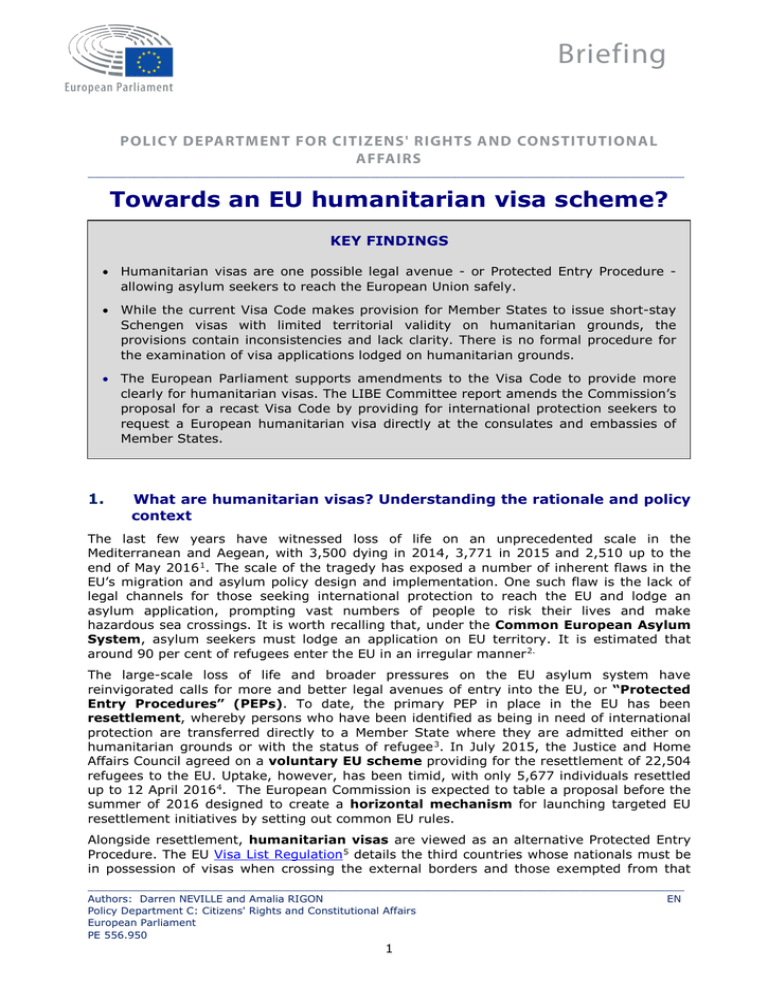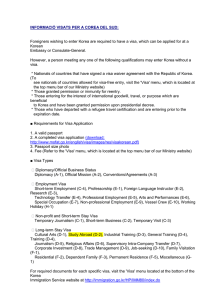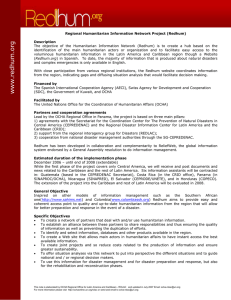Towards an EU humanitarian visa scheme?
Anuncio

Briefing POLICY DEPARTMENT FOR CITIZENS' RIGHTS AND CONSTITUTIONAL AFFAIRS ___________________________________________________________________________________________ Towards an EU humanitarian visa scheme? KEY FINDINGS • Humanitarian visas are one possible legal avenue - or Protected Entry Procedure allowing asylum seekers to reach the European Union safely. • While the current Visa Code makes provision for Member States to issue short-stay Schengen visas with limited territorial validity on humanitarian grounds, the provisions contain inconsistencies and lack clarity. There is no formal procedure for the examination of visa applications lodged on humanitarian grounds. • The European Parliament supports amendments to the Visa Code to provide more clearly for humanitarian visas. The LIBE Committee report amends the Commission’s proposal for a recast Visa Code by providing for international protection seekers to request a European humanitarian visa directly at the consulates and embassies of Member States. 1. What are humanitarian visas? Understanding the rationale and policy context The last few years have witnessed loss of life on an unprecedented scale in the Mediterranean and Aegean, with 3,500 dying in 2014, 3,771 in 2015 and 2,510 up to the end of May 2016 1. The scale of the tragedy has exposed a number of inherent flaws in the EU’s migration and asylum policy design and implementation. One such flaw is the lack of legal channels for those seeking international protection to reach the EU and lodge an asylum application, prompting vast numbers of people to risk their lives and make hazardous sea crossings. It is worth recalling that, under the Common European Asylum System, asylum seekers must lodge an application on EU territory. It is estimated that around 90 per cent of refugees enter the EU in an irregular manner 2. The large-scale loss of life and broader pressures on the EU asylum system have reinvigorated calls for more and better legal avenues of entry into the EU, or “Protected Entry Procedures” (PEPs). To date, the primary PEP in place in the EU has been resettlement, whereby persons who have been identified as being in need of international protection are transferred directly to a Member State where they are admitted either on humanitarian grounds or with the status of refugee 3. In July 2015, the Justice and Home Affairs Council agreed on a voluntary EU scheme providing for the resettlement of 22,504 refugees to the EU. Uptake, however, has been timid, with only 5,677 individuals resettled up to 12 April 2016 4. The European Commission is expected to table a proposal before the summer of 2016 designed to create a horizontal mechanism for launching targeted EU resettlement initiatives by setting out common EU rules. Alongside resettlement, humanitarian visas are viewed as an alternative Protected Entry Procedure. The EU Visa List Regulation 5 details the third countries whose nationals must be in possession of visas when crossing the external borders and those exempted from that ___________________________________________________________________________________________ Authors: Darren NEVILLE and Amalia RIGON EN Policy Department C: Citizens' Rights and Constitutional Affairs European Parliament PE 556.950 1 requirement. Virtually all countries of origin where asylum seekers are likely to come from do not enjoy visa waiver. Since potential asylum seekers are primarily nationals of countries requiring a visa to enter the European Union and "[…] often do not qualify for an ordinary visa, they may have to cross the border in an irregular manner" 6. Indeed, no European Union-wide legal routes of entry are available for asylum purposes, causing asylum seekers to take dangerous journeys to arrive on EU territory. Humanitarian visas allow asylum seekers to legally access a third country and/or apply for asylum following expedited asylum procedures, with the merit of the application examined in situ. Under the Common European Asylum System, a successful asylum application translates into the asylum seeker being granted either refugee status under the 1951 United Nations’ Convention relating to the Status of Refugees and its 1967 Protocol or subsidiary protection under the Qualification Directive 7. Under existing schemes, humanitarian visas are issued at the discretion of individual states. Unlike resettlement, humanitarian visas are requested directly by the third-country national at the consulate of the state where asylum is sought (i.e. outside its territory). The prescreening process can then be conducted extraterritorially before a humanitarian visa is issued, enabling the asylum seeker to reach the state in which he/she will apply for asylum safely and legally. The decision on the substance of the asylum application is then taken on that State’s territory. BRAZIL’S HUMANITARIAN VISA SCHEME In September 2013, Brazil's National Committee for Refugees created a special humanitarian visa for Syrians and other nationals affected by the Syrian war, as well as for family members living in countries neighbouring Syria. Brazilian embassies in those countries issue travel visas for people wanting to seek refuge in Brazil. Once these people arrive on Brazilian soil, they lodge a claim for asylum. The initiative has been warmly welcomed by the United Nations High Commissioner for Refugees (UNHCR) 8. 2. Humanitarian visas in the EU: current law and practice There is currently no EU scheme for humanitarian visas per se. Nevertheless, under the Visa Code Regulation, which sets out the procedures and conditions for issuing visas for the purpose of short stays and airport transit within the Schengen area, provision is made for visas to be issued “on humanitarian grounds”. Article 19 of the Visa Code stipulates that the admissibility requirements for a visa application can be waived on “humanitarian grounds”, while article 25 provides that, “where a Member State considers it necessary on humanitarian grounds”, a visa with limited territorial validity (LTV) must be issued. Here, it is important to stress the difference between two "type C Schengen visas": a "uniform visa" (article 2 §3), which is "[…] a visa valid for the entire territory of the Member States […]" and a “visa with limited territorial validity” (article 2 §4), which is "[…] a visa valid for the territory of one or more Member States but not all Member States […]". As such, an LTV visa issued on humanitarian grounds does not entitle the holder to free travel around the Schengen area, but rather places clear restrictions on that movement. Beyond the Visa Code provisions, Member States may also issue national long-stay visas. As demonstrated by the 2014 Policy Department for Citizens’ Rights and Constitutional Affairs study, “Humanitarian visas: option or obligation?” 9, as many as 16 EU Member States either have or have had some form of scheme for issuing humanitarian visas. This underscores that humanitarian visa schemes are recognised as valid legal avenues of entry. Nonetheless, the lack of detailed statistical data makes it difficult to assess actual implementation of humanitarian visa schemes or use of the humanitarian visas explicitly provided for under the Visa Code. With regard to LTV visas as regulated in article 25, it is only possible to obtain statistics for the total number issued EU-wide, without any indication 2 of the reasons for which they were issued. As table 1 below illustrates, the total number of Schengen type C LTV visas issued has decreased substantially from 298,117 in 2012 to 109,505 in 2015 10. Table 1 - Number of Schengen type C LTV visas issued Number of Schengen type C limited territorial validity visas issued Year 2012 298,117 2013 176,948 2014 127,673 2015 109,505 Source: European Commission, DG HOME 3. Humanitarian visas in the EU: challenges with the current framework The 2014 Policy Department study 11 pinpointed a number of issues related to the current framework governing humanitarian visas. Firstly - and critically in the case of asylum there is a mismatch between the wording of articles 19 §4 and 25 §1A of the Visa Code. Whereas article 25 provides for the issuing of LTV visas on “humanitarian grounds”, for “reasons of national interest” or, crucially, owing to “international obligations”, article 19 states that visa admissibility requirements can be waived only on “humanitarian grounds” or “for reasons of national interest”. Thus, visa admissibility requirements may not be waived because of a Member State’s international obligations (e.g. under the Refugee Convention). The importance of this is clear given that a visa applicant may challenge a decision not to grant an LTV visa under article 25 (see article 32 §3), but has no right of appeal if an application is deemed inadmissible under article 19. Given that applicants for humanitarian visas will frequently not have the requisite paperwork, this mismatch seriously undermines the scope for obtaining an LTV humanitarian visa. Indeed, “if a Member State recognises the humanitarian situation to be sufficiently serious as to warrant derogation from admissibility requirements, it seems logical that the humanitarian situation would be considered sufficiently serious for the Member State to issue an LTV visa” 12. As the study outlines, it is far from clear in the Visa Code whether consulates are supposed to conduct a mandatory examination of “humanitarian grounds” - itself a concept undefined in EU law. This is particularly important since there is no separate procedure established for the lodging and processing of an application for an LTV visa, meaning that the notion of “humanitarian grounds” or “international obligations” is examined in “ordinary” visa applications. Against this backdrop, the study advocates establishing a formal procedure for the lodging and processing of applications for humanitarian Schengen visas. 4. Prospects for a fully-fledged EU humanitarian visa scheme The recast Visa Code proposal and the position of the European Commission and Council The European Commission’s April 2014 proposal for a recast of the Visa Code did not contain any proposed changes to the current framework for humanitarian visas. Indeed, the Commission has been consistently reticent about laying down an EU humanitarian visa scheme in the Visa Code, arguing that Schengen visas are designed for short stays while 3 people in need of protection come to the EU for a longer period of time 13. It has instead floated the idea of establishing "humanitarian permits", though no firm proposal has been forthcoming. Doubtless concerned about some of the practical challenges inherent in a larger-scale humanitarian visa scheme - notably the capacity of Member State consulates to properly administer it both safely and efficiently - and keen to retain national control over such schemes, the Council supports the Commission approach. In fact, as the 2014 Policy Department study explains, the Commission proposal introduces two crucial new aspects that could further complicate the examination of visa applications lodged on humanitarian grounds. The first is the provision made for cooperation with external service providers, which would be responsible for tasks closely linked to assessing the admissibility requirements for a visa application (articles 38 §3 & 41). The second is the inclusion of mandatory representation provisions. Under these arrangements, where the Member State to which the applicant is applying is neither present nor represented under an existing representation arrangement in a given third country, any other Member State present in that same third country would be obliged to process visa applications on its behalf (articles 38 §2b & 39). Yet, there is no explicit requirement for the representing Member State intending to refuse a visa application to forward the application to the represented Member State in order for it to take the final decision. Again, this could present challenges in situations where visas are sought for humanitarian reasons. The European Parliament position The European Parliament has consistently called for the establishment of safe and legal avenues to enable protection seekers to reach the European Union. In its 12 April 2016 resolution on the situation in the Mediterranean and the need for a holistic EU approach to migration 14, the European Parliament argues that “persons seeking international protection should be able to apply for a European humanitarian visa directly at any consulate or embassy of the Member States” and that “it is necessary to amend the Union Visa Code by including more specific provisions on humanitarian visas”. This translates very clearly into the Visa Code report adopted by the Civil Liberties, Justice and Home Affairs Committee in March 2016 and tabled for plenary on 22 April 201615 (rapporteur Juan Fernando López Aguilar). Indeed, the Parliament spells out in its amended recitals that the provisions it inserts on humanitarian visas aim to facilitate legitimate and safe travel to the European Union (amendment n°7) and compliance with the EU's international obligations (amendment n°8). Specifically, in the main body of the text, the Parliament amends the proposal to allow persons in need of international protection to "apply for a European humanitarian visa directly at any consulate or embassy of the Member States" (amendment n°95). It also suggest that Member States should be empowered to exempt European humanitarian visa holders from the standard period of validity (90 days in any 180 days) for a renewable period of 12 months (amendment n°60). Regarding cooperation with external service providers, amendment n°127 of the report clearly circumscribes the extent to which consulates may have recourse to them (i.e. when "other solutions are not possible"), while amendment n°133 introduces monitoring of external service providers. Finally, under one of its recitals (n°15), the report revives the idea of establishing "Schengen Visa Centres" (amendment n°11). Trilogue talks between the Parliament, Council and Commission have recently begun, with the humanitarian visa question likely to prove very challenging. 4 For up-to-date figures, see: http://data.unhcr.org/mediterranean/regional.php. L. Facchi, (ed.) (2012), Exploring avenues for protected entry in Europe, Italian Council for Refugees, page 17. 3 European Commission, Fact Sheet, “Extraordinary European Council on Migration: Frequently Asked Questions”, 23 April 2015, available at: http://europa.eu/rapid/press-release_IP-16-1343_en.htm or UNHCR website http://www.unhcr.org/resettlement.html. 4 European Commission, Press Release, Relocation and Resettlement: EU Member States urgently need to deliver, Strasbourg, 12 April 2016, available at: http://europa.eu/rapid/press-release_IP-16-1343_en.htm 5 Regulation (EU) No 1289/2013 of the European Parliament and of the Council of 11 December 2013 amending Council Regulation (EC) No 539/2001 listing the third countries whose nationals must be in possession of visas when crossing the external borders and those whose nationals are exempt from that requirement, available at: http://eur-lex.europa.eu/legal-content/EN/TXT/PDF/?uri=CELEX:32013R1289&from=EN 6 FRA (2014), Handbook on European law relating to asylum, borders and immigration, European Union Agency for Fundamental Rights, pages 3-10, available at: http://fra.europa.eu/en/publication/2013/handbook-european-lawrelating-asylum-borders-and-immigration. 7 Council Directive 2004/83/EC of 29 April 2004 on minimum standards for the qualification and status of third country nationals or stateless persons as refugees or as persons who otherwise need international protection and http://eurthe content of the protection granted, available at: lex.europa.eu/LexUriServ/LexUriServ.do?uri=CELEX:32004L0083:en:HTML 8 UNHCR, Briefing Notes, “UNHCR welcomes Brazil humanitarian visas for Syrians fleeing conflict”, 27 September 2013, available at: http://www.unhcr.org/news/briefing/2013/9/524574d39/unhcr-welcomes-brazil-humanitarianvisas-syrians-fleeing-conflict.html. 9 Ulla Iben Jensen, Humanitarian visas: option or obligation?, European Parliament, September 2014, available at: http://www.europarl.europa.eu/RegData/etudes/STUD/2014/509986/IPOL_STU(2014)509986_EN.pdf. 10 Directorate-General for Migration and Home Affairs, Visa policy, availale at: http://ec.europa.eu/dgs/homeaffairs/what-we-do/policies/borders-and-visas/visa-policy/index_en.htm. 11 Ibid n°9. 12 Ibid n°9. 13 LIBE Committee meeting, 5 March 2013, video available at: http://www.europarl.europa.eu/eplive/en/committees/video?event=20150305-0900-COMMITTEE-LIBE. 14 European Parliament resolution on the situation in the Mediterranean and the need for a holistic EU approach to migration, 12 April 2016, available at: http://www.europarl.europa.eu/sides/getDoc.do?type=TA&reference=P8TA-2016-0102&language=EN&ring=A8-2016-0066. 1 2 15 European Parliament, Plenary sitting, Report on the proposal for a regulation of the European Parliament and the Council on the Union Code on Visas (Visa Code) (recast), LIBE Committee, available at: http://www.europarl.europa.eu/sides/getDoc.do?pubRef=-//EP//NONSGML+REPORT+A8-20160145+0+DOC+PDF+V0//EN DISCLAIMER The content of this document is the sole responsibility of the author and any opinions expressed therein do not necessarily represent the official position of the European Parliament. It is addressed to Members and staff of the EP for their parliamentary work. Reproduction and translation for non-commercial purposes are authorised, provided the source is acknowledged and the European Parliament is given prior notice and sent a copy. This document is available at: www.europarl.europa.eu/studies Contact: [email protected] Manuscript completed in June 2016 © European Union PE 556 950 CATALOGUE: QA-02-16-564-EN-C (paper) CATALOGUE: QA-02-16-564-EN-N (pdf) ISBN: 978-92-823-9392-5 (paper) ISBN: 978-92-823-9391-8 (pdf) doi:10.2861/117158 (paper) doi:10.2861/156904 (pdf)



